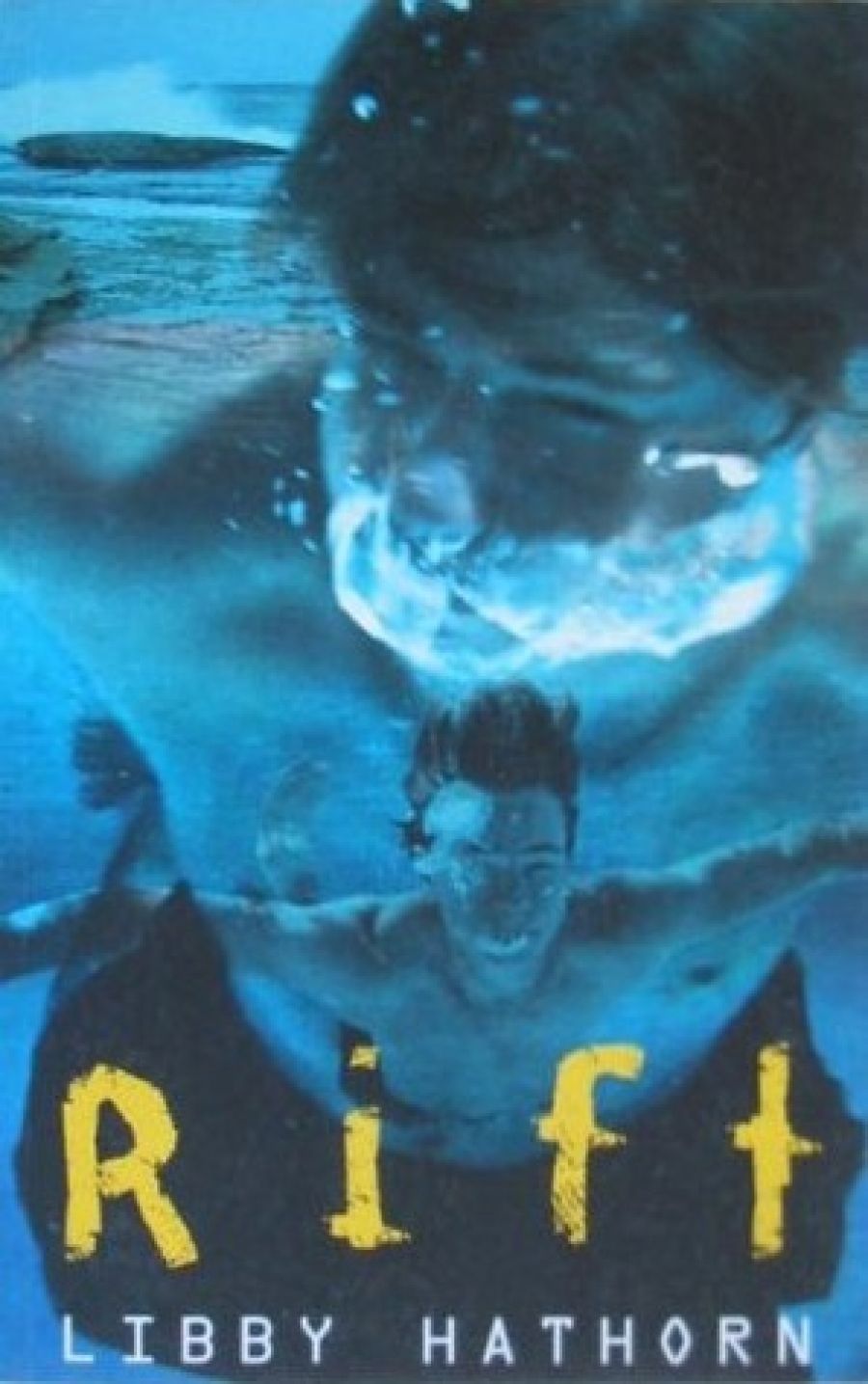
- Free Article: No
- Contents Category: Fiction
- Review Article: Yes
- Online Only: No
- Custom Highlight Text:
I am sitting at my home desk high up in the mountains overlooking the border ranges to New South Wales and then to the left, the strip of highrise, the Gold Coast, and the sea beyond. Hathorn and Lucashenko have both set their recent youth novels in an imaginary location not far from me. The sea and the hinterland is a territory I am beginning to know well and I have enjoyed exploring it a little further in my reading.
- Book 1 Title: Rift
- Book 1 Biblio: Hodder Headline, $14.95 pb, 220 pp
- Book 2 Title: Killing Darcy
- Book 2 Biblio: UQP, $12.95 pb, 230 pp
In this novel Rift, the teenage boy Vaughan is dumped on his grandmother by his parents who hope to make it big-time in the music industry and don’t need a teenager cramping their style. The plus for Vaughan is that his grandmother lives in a remote and small seaside community where fishing, diving, and surfing are the regular activities of the local kids. But breaking into the gang is harder than Vaughan anticipated. He has to earn his membership by attempting a life-threatening dive through a labyrinth of coral tunnels. Rod, one of the boys, befriends him, and over the long summer trains Vaughan until his strength, his swimming, and his all-important breath control, are sufficient to survive the dive at low tide.
But as the two train in the safety of their underwater world, above on dry land the township is changing forever. The sinister new pastor ingratiates himself into household after household until the town’s families have all but moved into his compound. The township is virtually deserted except for Rod’s family and Vaughan’s grandmother who believes in the pastor, but who is too attached to her old house to leave it without an inner struggle. Eventually she too moves to the compound.
The key to the town’s folk survival centres around Vaughan’s ability to keep his head and take the difficult dive. But it is high tide and the all-important pockets of air in the underwater tunnels are gone.
Reading Hathorn’s novel, I was genuinely afraid, not so much for the characters as their fate slowly unwound, but for myself – for the believability of her text, for the way small communities, such as the one I live in, could succumb to the power of a charismatic madman. There is real tension here which is maintained to the last page. Hathorn writes with a chilling strength.
Where Hathorn’s strength is her tension she does not manage to create place. I could not smell the sea or feel the moist tropical air in Hathorn’s novel which could have been set at any beachside town. Melissa Lucashenko, on the other hand, is a master of place. She sets her youth novel in Shelley Bay and its surrounding hinterland, not so much unlike Byron Bay just down the road from me. Again it is a country I know well. The clouds and warm rain of summer were there in her text.
Lucashenko’s novel centres around horses, as Darcy an Aboriginal boy takes a job on a property which breaks, breeds and rides horses. The ex-hippy Jon owns and works the property with his teenage son Cam. Over summer Jon’s daughter by another marriage, Fil, comes to stay. She’s a Melbourne girl and delightfully wilful. During one of her solo horse rides she comes across a ruin, almost hidden in the lantana covered hills. It’s an eerie place and unnerves her, but something drives her on and into the dark ruin of the house. There she finds a camera that is almost a hundred years old. Her brother Cam is an amateur photographer and loads the camera with filmstrip. But the camera doesn’t take the photos they think it will and leads the kids into an intriguing world of tribal Aboriginal life, a bora ring, the local history of European massacres of the blacks and a lot more.
For my reading there is just too much here. Too much homosexuality, the only boy who definitely isn’t gay is Cam; too much guilt; too much moralising from the hippy dad and the Aboriginal elder woman. The plot twists in a Dickensian way where lost families are reunited and everyone ends up related to everyone else. But having said this, it should also be said that I’m not fanatical about horses and I don’t watch the television program, Home and Away. A lot of people do, and those kids would love this book.
For me, I like Lucashenko’s strong sense of place. She’s reminded me that it’s time I took a day off to drive down the road, stop at the fishing village of Brunswick Heads and watch the small boats come and go, and then onto Byron, to coffee with some of my hippy mates.


Comments powered by CComment